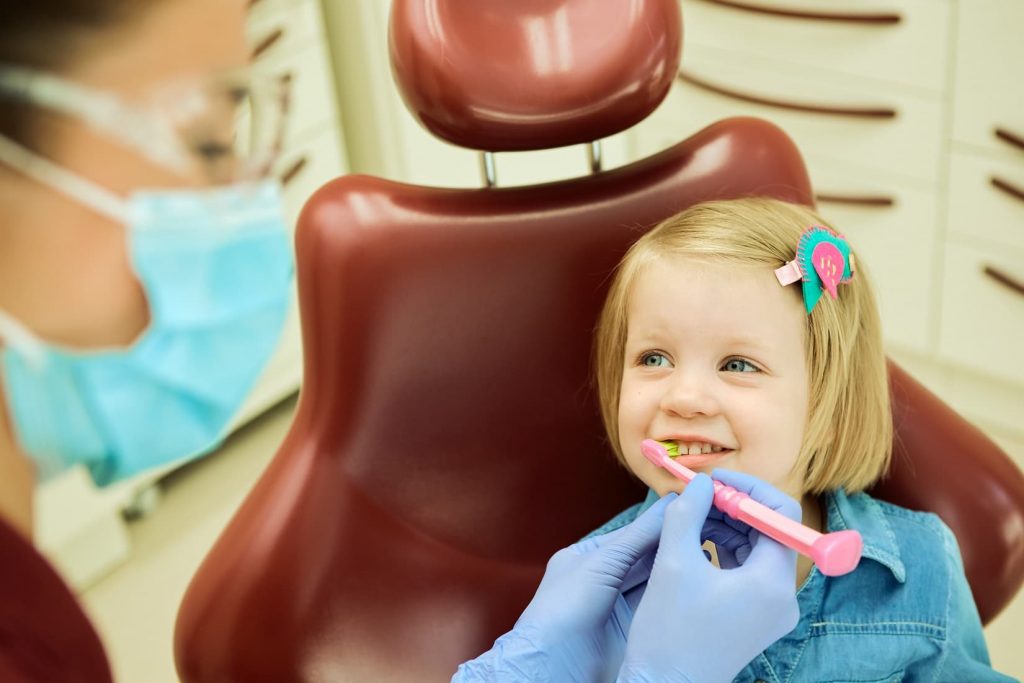Dental Care for Children and Adolescents
Proper oral hygiene is not only essential to one’s oral health and comfort, it is also essential to one’s general health and comfort. Establishing basic oral hygiene routines and dental care from an early age can not only make for easy habits, but it can also help to ensure that the child’s teeth, mouth and body remain as healthy and comfortable as possible as they first get their primary teeth and then, losing these, get their adult teeth. This is why dental care for children and adolescents is so very important.

The Benefits of Pediatric Dental Care
Proper oral hygiene habits can begin in infancy, before teeth even erupt in the mouth. Using gauze or a soft washcloth, the gums can be very gently wiped and cleaned. Once teeth begin to erupt into the mouth, they should be cleaned a couple times a day with a toothbrush that is specially designed for babies and is soft and gentle. While it may seem odd to begin oral hygiene habits this young, it makes sense if one understands that bottle feeding and even limited eating does have the potential to cause decay. The sugars that are present in food and beverages, including milk and baby formula, allow for bacteria in the mouth to form enamel-damaging acid. The result is demineralization and decay, which often results in cavities in the primary teeth.
Children should begin seeing the dentist between one and two years of age. At the initial visit, the dentist will focus on introducing himself to the child and will only perform very basic examination actions (like counting teeth and visually inspecting for signs of decay and other issues) if the child is willing and comfortable. Not only can this help to ensure a proper start to good oral hygiene, it can help to introduce the child to the dentist in a way that is pleasant and stress-free.
Over subsequent visits, the dentist will gradually expand his dental care to include plaque removal and the resolution of dental issues as needed. Since plaque is literally full of bacteria, regular dental care from an early age can help to prevent bacteria from continuing to grow in the mouth and causing major issues like tooth decay and gum inflammation. The dentist can also help to ensure that as primary teeth fall out and adult teeth grow in, the child’s mouth remains healthy and comfortable.
A pediatric dentist will also advise parents on how to protect their child’s oral health and take care of their teeth. This can include instructions on how to correctly brush and floss a child’s teeth and any information that is specific to their child’s teeth or oral health. Following are just a few of the points the dentist should cover:
- Eating habits and how they can affect oral health. Generally speaking, diets that are high in sugar and starch can present a problem as regards good oral health. It is also best to avoid allowing children to go to bed with a bottle containing something other than water (like milk or juice). Many children who are allowed to fall asleep with a bottle tend to keep some liquid in their mouth. Unfortunately, if the liquid is something other than water, it can contain bacteria-feeding sugars, which means that it can eventually lead to tooth decay issues.
- Exactly how to brush and floss, and with what tools. While brushing and flossing are important, correctly brushing and flossing are even more important. Failing to brush all tooth surfaces or brushing them too hard with stiff bristles are likewise potentially damaging to your teeth. The dentist can advise you on the correct toothbrush and floss to use, as well as the best motions and pressure to use while cleaning the teeth.
Even though babies don’t usually start getting teeth until they are six months old, it is important that their mouths are kept healthy from the start. A child’s primary teeth are very important, and taking proper care of them sets the stage for healthy adult teeth. As the child’s adult teeth begin to come in, these too need to be properly taken care of in order to ensure a healthy mouth in the future.
For more information about dental care for children and adolescents, contact Dr. Nurminsky today.
